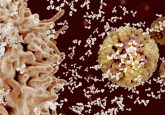Pembrolizumab as first-line therapy for metastatic non-small-cell lung cancer

Abstract
This review describes trials evaluating the monoclonal antibody pembrolizumab (an immunotherapy that blocks the interaction between programmed death-1 and programmed death-ligand 1 and 2 [PD-L1/PD-L2]) as first-line therapy for advanced non-small-cell lung cancer (NSCLC). In the Phase III KEYNOTE-024 study, pembrolizumab monotherapy significantly improved progression-free survival (primary end point) and overall survival, and was associated with fewer adverse events compared with platinum-based chemotherapy in patients with NSCLC with PD-L1 expression on ≥50% of tumor cells. In cohort G of the Phase I/II KEYNOTE-021 study, pembrolizumab plus pemetrexed and carboplatin significantly improved objective response rate (primary end point) and progression-free survival versus pemetrexed and carboplatin alone, and had manageable toxicity in patients with nonsquamous NSCLC. These results have changed first-line management of advanced NSCLC.
Keywords: checkpoint inhibitor, immunotherapy, non-small-cell lung cancer, pembrolizumab
First-line therapy for non-small-cell lung cancer
Platinum-based doublet chemotherapy regimens remain the cornerstone of treatment for patients with recurrent/metastatic non-small-cell lung cancer (NSCLC) without EGFR mutations or ALK translocations (i.e., nononcogene-addicted NSCLC) [1,2]. Incremental improvements in efficacy have been achieved for some patients with nonsquamous tumors with the addition of treatment options such as bevacizumab, a monoclonal antibody against VEGF [3,4], and pemetrexed, a folate analog metabolic inhibitor [5].
Click here to read the full article in Immunotherapy.





